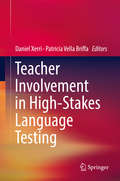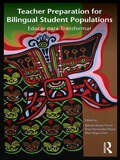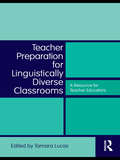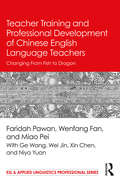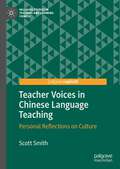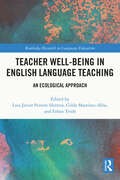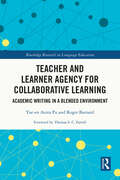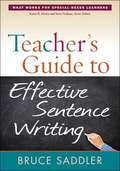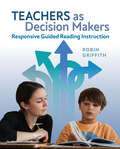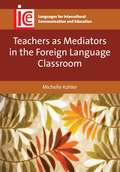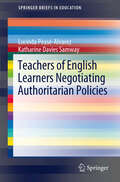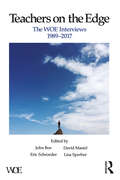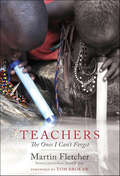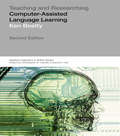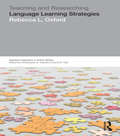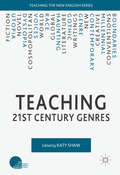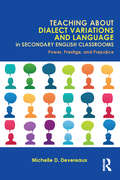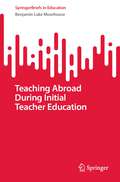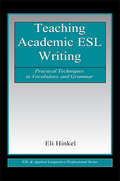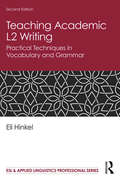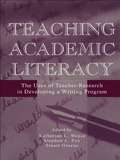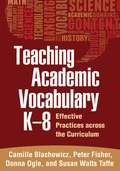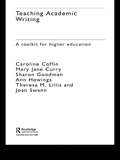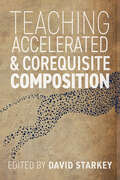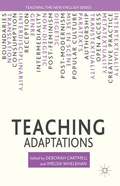- Table View
- List View
Teacher Involvement in High-Stakes Language Testing
by Daniel Xerri Patricia Vella BriffaThis book advocates that teachers should play an active role in high-stakes language testing and that more weight should be given to teacher judgement. This is likely to increase the formative potential of high-stakes tests and provide teachers with a sense of ownership. The implication is that the knowledge and skills they develop by being involved in these tests will feed into their own classroom practices. The book also considers the arguments against teacher involvement, e.g. the contention that teacher involvement might entrench the practice of teaching to the test, or that teachers should not be actively involved in high-stakes language testing because their judgement is insufficiently reliable. Using contributions from a wide range of international educational contexts, the book proposes that a lack of reliability in teacher judgement is best addressed by means of training and not by barring educators from participating in high-stakes language testing. It also argues that their involvement in testing helps teachers to bolster confidence in their own judgement and develop their assessment literacy. Moreover, teacher involvement empowers them to play a role in reforming high-stakes language testing so that it is more equitable and more likely to enhance classroom practices. High-stakes language tests that adopt such an inclusive approach facilitate more effective learning on the part of teachers, which ultimately benefits all their students.
Teacher Preparation for Bilingual Student Populations: Educar para Transformar
by Belinda Bustos FloresThe growing number of bilingual students in public schools coupled with a critical shortage of teachers specially prepared to serve this population calls for a critical examination of policies and practices in bilingual and ESL teacher preparation. This volume focuses on understanding the structural, substantive, and contextual elements of preparation programs, and provides transformative guidelines for creating Educar signature programs. Designed to improve the practice of teacher preparation by promoting dialogic conversations and applications of praxis in the preparation of bilingual/ESL teacher candidates, it emphasizes that exemplary teacher preparation requires transformative teacher educators. Simultaneously organizing the scholarship in the field and advancing new understandings, this book is must-have resource for current and future teacher educators. Contributors include Maria Brisk, Sylvia Celédon-Pattichis, Lourdes Diaz-Soto, Eugene García, Virginia Gonzáles, Guillermo Solano-Flores, Maria Torres-Guzman, Carmen Mercado, Bertha Pérez, Mari Riojas-Cortez, Francisco Rios, Concepción Valadez, and Angela Valenzuela.
Teacher Preparation for Linguistically Diverse Classrooms: A Resource for Teacher Educators
by Tamara LucasTeacher educators today need knowledge and practical ideas about how to prepare all pre-service and in-service teachers (not just bilingual or ESL specialists) to teach the growing number of students in K-12 classrooms in the United States who speak native languages other than English. This book is at the forefront in focusing exclusively on the preparation of mainstream classroom teachers for this population of students. Part one provides the conceptual and contextual framework for the book, including a comprehensive discussion of relevant demographic trends and an analysis of national and state policies. Part two presents examples of initiatives in different institutional and geographic settings, highlighting three essential elements of teacher preparation: curriculum content, program design, and program coherence. Meeting a pressing need among teacher educators left to figure out, largely by trial and error, how best to prepare non-specialist classroom teachers to work with ELLs, this book both contributes to the research base and provides practical information to help readers envision possibilities they can apply in their own settings.
Teacher Training and Professional Development of Chinese English Language Teachers: Changing From Fish to Dragon (ESL & Applied Linguistics Professional Series)
by Faridah Pawan Pei Miao Wenfang FanThis up-close look at Chinese ESL teachers documents undertakings at formal and informal levels to support and sustain their expertise in ways that balance collaborative and competitive efforts, situated and standards-based programs, ethnically responsive and government-based efforts, and traditional and 21st-century teaching visions. English is a mandated subject for approximately 400 million Chinese public school students. Making transparent the training and professional development received respectively by pre-service and in-service teachers, this book provides a rare window into how Chinese English Language teachers (ELTs) reconcile the two needs with the responsibility to teach large numbers of students while also navigating societal, cultural, and institutional cross currents. It also explores the range of ways China invests in the training and professional development of its English language teachers.
Teacher Voices in Chinese Language Teaching: Personal Reflections on Culture (Palgrave Studies in Teaching and Learning Chinese)
by Scott SmithThis book reports the results of an ethnographic study, focusing primarily on the experiences of four teachers of the Chinese language in Australian secondary schools. The author creates an audience for their voices as they reflect on their own understandings of culture, language teaching, and culture in language teaching through semi-structured interviews, and compares these reflections with written stimulus dialogues designed to elicit 'culture-in-language' reflections, as well as curriculum and policy documents produced by the Australian government. The book's findings indicate that teachers of the Chinese language are diverse in their views on culture, language teaching, and the ways in which culture can or should inform language teaching, and the author argues that language teacher intercultural competence cannot be assessed through a synthesis of the current English-only research literature. This book will be of interest to teachers and teacher trainers of Chinese as a foreign language, as well as students and scholars of applied linguistics and language education more broadly.
Teacher Well-Being in English Language Teaching: An Ecological Approach (Routledge Research in Language Education)
by Luis Javier Pentón Herrera Gilda Martínez-Alba Ethan TrinhThis edited volume brings the important topic of teacher well-being to the fore, presenting a range of high quality and cutting-edge contributions that illuminate, advance and educate readers on the challenges and criticality of achieving teacher well-being in English language teaching (ELT). Taking Sarah Mercer’s call for action to make teacher well-being a priority in the ELT field, and adopting an ecological perspective reflective of the stance that teacher well-being is a societal duty and not a personal responsibility, the contributors present theoretically and methodologically innovative research studies from all around the world. The term ‘teacher’ is used to refer to those who deliver English instruction in a variety of formal and informal educational settings and at different levels including K-12 schools, adult education, higher education, teacher education programs, and in community organizations. Chapters offer clear implications for research and practice, and explore effective practices and interventions that can contribute to the improvement of teacher well-being overall. Addressing a profession which is not only characterized as being filled with high levels of stress, but delving into specific challenges around ELT in particular, the authors crucially speak to themes around the additional emotional investment and labor which come with being an English language teacher. As such, it will appeal to academics and researchers in the field of English language teaching, including scholar-practitioners, and teacher educators.
Teacher and Learner Agency for Collaborative Learning: Academic Writing in a Blended Environment (Routledge Research in Language Education)
by Yue-en Anita Pu Roger BarnardThis book offers educators practical strategies to cultivate agency in both teachers and learners. By focusing on collaborative learning through writing, blended learning and reflective practice, it equips readers with essential tools to enhance their teaching methods and promote learner autonomy in various educational contexts.Blending theory with real-world applications, the book demonstrates how learner and teacher agency are deeply interconnected, showing how collaboration, technology and reflective practices create more dynamic, student-centred classrooms. The first author’s action research project provides practical insights, illustrating how agency can be fostered in both in-person and blended learning environments. Readers will also gain valuable perspectives from other teachers, who share how reflective practice has helped them improve their own agency, as well as their students’ engagement and independence.Educators, teacher educators and researchers across disciplines will find this book indispensable for its evidence-based strategies, offering actionable approaches to fostering agency, collaboration and professional development in today’s rapidly evolving educational landscape.
Teacher's Guide to Effective Sentence Writing
by Bruce SaddlerThis practical book provides explicit instructions for teaching sentence-level skills to students who have difficulties in this area. The author explains the key role of sentence combining in the writing process and presents effective techniques for instruction and assessment. Numerous sample lessons, practice activities, planning tips, and grammatical pointers make it easy for teachers to incorporate sentence combining and construction into the writing curriculum at all grade levels (2-12). Accessible and engaging, the book helps teachers and students experiment with different ways to arrange thoughts and produce meaningful written work.
Teachers as Decision Makers: Responsive Guided Reading Instruction
by Robin GriffithIn Teachers as Decision Makers: Responsive Guided Reading Instruction , Robin Griffith draws on years of research and countless interactions with students and teachers to present a framework of instructional decision making centered on the readers we work with, the books we share with them, and the instructional objectives we guide them toward.In this fresh look at the instructional choices we make, Griffith offers an in-depth guide in which you&’ll discover how to make effective, student-driven decisions, both while planning for and in the moments of teaching at the guided reading table, including: The Teacher Decision Making Framework, grounded in the learner, the goal, and the text Direct applications across three guided reading text level bands: Emergent, Early, and Transitional Tables, charts, and reproducible materials for easy reference in assessing and monitoring key reading behaviors at each band 50 quick reference Decision Guides for practical planning and responding in three instructional areas: Word Solving, Fluency and Expression, and Comprehension Whether you&’re new to guided reading or looking to refine your practice, this practical resource will give you the tools you need to elevate your instruction and refine your ability to make effective decisions when teaching young readers.
Teachers as Mediators in the Foreign Language Classroom
by Michelle KohlerLanguage teachers are key figures in preparing young people for participation in an increasingly multilingual and culturally diverse world, yet little is known about how they go about this in practice. This book uses examples of classroom interaction to reveal how teachers of languages act as intercultural mediators and the implications of this for practice. To date, there has been little exploration of how teachers mediate language and culture learning from an intercultural perspective, and what underlies their mediation practices in terms of their conceptions of intercultural language teaching and learning. This book offers an account of what teachers are thinking, feeling and doing as they enact an intercultural perspective on language teaching and learning.
Teachers of English Learners Negotiating Authoritarian Policies
by Lucinda Pease-Alvarez Katharine Davies SamwayIn an effort to reverse the purported crisis in U.S. public schools, the federal government, states, districts have mandated policies that favor standardized approaches to teaching and assessment. As a consequence, teachers have been relying on teacher-centered instructional approaches that do not take into consideration the needs, experiences, and interests of their students; this is particularly pronounced with English learners (ELs). The widespread implementation of these policies is particularly striking in California, where more than 25% of all public school students are ELs. This volume reports on three studies that explore how teachers of ELs in three school districts negotiated these policies. Drawing on sociocultural and poststructural perspectives on agency and power, the authors examine how contexts in which teachers of ELs lived and worked influenced the messages they constructed about these policies and mediated their decisions about policy implementation. The volume provides important insights into processes affecting the learning and teaching of ELs.
Teachers on the Edge: The WOE Interviews, 1989–2017
by David Masiel Eric Schroeder John Boe Lisa SperberFor over 25 years, the journal Writing on the Edge has published interviews with influential writers, teachers, and scholars. Now, Teachers on the Edge: The WOE Interviews, 1989–2017 collects the voices of 39 significant figures in writing studies, forming an accessible survey of the modern history of rhetoric and composition. In a conversational style, Teachers on the Edge encourages a remarkable group of teachers and scholars to tell the stories of their influences and interests, tracing the progress of their contributions. This engaging volume is invaluable to graduate students, writing teachers, and scholars of writing studies.
Teachers: The Ones I Can’t Forget
by Martin FletcherTeachers are the people Martin Fletcher met throughout his work as a news correspondent, often on the worst day of their lives. He watched as they picked up the pieces following personal tragedy and discovered the invaluable lesson of carrying on, no matter the circumstances. Through intimate profiles, Martin Fletcher’s Teachers details the struggles of everyday people in extraordinary circumstances—war, revolution, natural disasters and yes, life. Fletcher’s writing is uplifting as he examines the truth of resilience despite hardship. These are the people he sought out in his international reporting, detailing their woes while celebrating their will to survive and recover. Teachers offers a unique take on reporting, as it features a traveling photo exhibit that Fletcher created to accompany the book. Each chapter is paired with an extraordinary digital montage to illustrate the stories taken directly from his reporting from NBC news programs. At a time when news coverage is often dismissed as fake or biased, Teachers is a welcome reminder of the integrity, devotion and empathy that goes into true reporting of the world. As Tom Brokaw wrote, “Fletcher has a calling.”
Teaching & Researching: Computer-Assisted Language Learning (Applied Linguistics in Action)
by Ken BeattyComputers play a crucial and rapidly evolving role in education, particularly in the area of language learning. Far from being a tool mimicking a textbook or teacher, Computer-Assisted Language Learning (CALL) has the power to transform language learning through the pioneering application of innovative research and practices. Technological innovation creates opportunities to revisit old ideas, conduct new research and challenge established beliefs, meaning that the field is constantly undergoing change. This fully revised second edition brings teachers and researchers up-to-date by offering:A comprehensive overview of CALL and current research issuesStep-by-step instructions on conducting research projects in CALL Extensive resources in the form of contacts, websites and free software references A glossary of terms related to CALLClosely linked to other branches of study such as autonomy in language learning and computer science, CALL is at the cutting edge of current research directions. This book is essential reading for all teachers and researchers interested in using CALL to make language learning a richer, more productive and more enjoyable task. Ken Beatty has taught at colleges and universities in Canada, Asia and the Middle East. His publications include more than 100 textbooks for learning English as a Second Language, as well as various websites, CD-ROMs and educational videos.
Teaching & Researching: Self-regulation In Context, Second Edition (Applied Linguistics in Action)
by Rebecca L. OxfordOver the past thirty years, the field of language learning strategies has generated a massive amount of interest and research in applied linguistics. Teaching and Researching Language Learning Strategies redraws the landscape of language learning strategies at just the right time. In this book Rebecca Oxford charts the field systematically and coherently for the benefit of language learning practitioners, students, and researchers. Offering practical, innovative suggestions for assessing, teaching, and researching language learning strategies, she provides examples of strategies and tactics from all levels, from beginners to distinguished-level learners, as well as a new taxonomy of strategies for language learning. In demonstrating why self-regulated learning strategies are necessary for language proficiency, Oxford integrates socio-cultural, cognitive, and affective dimensions, and argues convincingly for the need for conceptual cross-fertilization. Providing clear and concise explanations of the advantages and limitations of the different approaches, this book is full of practical value and theoretical insights. The book is designed to guide the reader with the use of a range of features, including: key quotes and concept boxes preview questions and chapter overviews glossary and end-of-chapter further readings sources and resources section
Teaching 21st Century Genres
by Katy ShawThis book is the first ever collection about twenty-first century genre fiction. It offers accessible yet rigorous critical interventions in a growing field of popular culture and academic study, presenting new genres as a fascinating and powerful means of reading contemporary culture. The collection explores the history and uses of genre to date, analyses key examples of innovations and developments in the field and reflects on how these texts have been mobilised in teaching since the year 2000. It explores a range of new twenty-first century genres through a close reading of key examples, along with a broader critical overview at the beginning of each chapter capturing wider developments, contexts and themes. As a result of this contextual, text-orientated approach, the book promotes a broad appeal beyond the specifics of new genres and authors, and will contribute to a wider understanding of developments in post-millennial fictions.
Teaching About Dialect Variations and Language in Secondary English Classrooms: Power, Prestige, and Prejudice
by Michelle D. DevereauxStandardized tests demand Standard English, but secondary students (grades 6-12) come to school speaking a variety of dialects and languages, thus creating a conflict between students’ language of nurture and the expectations of school. The purpose of this text is twofold: to explain and illustrate how language varieties function in the classroom and in students’ lives and to detail linguistically informed instructional strategies. Through anecdotes from the classroom, lesson plans, and accessible narrative, it introduces theory and clearly builds the bridge to daily classroom practices that respect students’ language varieties and use those varieties as strengths upon which secondary English teachers can build. The book explains how to teach about language variations and ideologies in the classroom; uses typically taught texts as models for exploring how power, society, and identity interact with language, literature, and students’ lives; connects the Common Core State Standards to the concepts presented; and offers strategies to teach the sense and structure of Standard English and other language variations, so that all students may add Standard English to their linguistic toolboxes.
Teaching Abroad During Initial Teacher Education (SpringerBriefs in Education)
by Benjamin Luke MoorhouseThis book explores teaching abroad during initial teacher education, an increasingly common practice in the initial preparation of teachers. Teaching abroad involves pre-service teachers spending a defined period teaching in a foreign country or in an alternative, and preferably a distinctly different, education system from the one in which they are receiving their initial teacher education. The book, drawing on relevant literature and the author’s first-hand experience of developing and leading a teaching-abroad project, is a concise but comprehensive introduction to the field. Important aspects of the initiative, such as rationale, project designs, benefits, criticisms and limitations, community considerations and future possibilities are included. The book is an important starting point for teacher educators interested in developing teaching abroad projects, as well as academics and scholars interested in the principles, practices, and debates around teaching abroad in initial teacher education.
Teaching Academic ESL Writing: Practical Techniques in Vocabulary and Grammar (ESL & Applied Linguistics Professional Series)
by Eli HinkelTeaching Academic ESL Writing: Practical Techniques in Vocabulary and Grammar fills an important gap in teacher professional preparation by focusing on the grammatical and lexical features that are essential for all ESL writing teachers and student-writers to know. The fundamental assumption is that before students of English for academic purposes can begin to successfully produce academic writing, they must have the foundations of language in place--the language tools (grammar and vocabulary) they need to build a text. This text offers a compendium of techniques for teaching writing, grammar, and lexis to second-language learners that will help teachers effectively target specific problem areas of students' writing. Based on the findings of current research, including a large-scale study of close to 1,500 non-native speakers' essays, this book works with several sets of simple rules that collectively can make a noticeable and important difference in the quality of ESL students' writing. The teaching strategies and techniques are based on a highly practical principle for efficiently and successfully maximizing learners' language gains. Part I provides the background for the text and a sample of course curriculum guidelines to meet the learning needs of second-language teachers of writing and second-language writers. Parts II and III include the key elements of classroom teaching: what to teach and why, possible ways to teach the material in the classroom, common errors found in student prose and ways to teach students to avoid them, teaching activities and suggestions, and questions for discussion in a teacher-training course. Appendices to chapters provide supplementary word and phrase lists, collocations, sentence chunks, and diagrams that teachers can use as needed. The book is designed as a text for courses that prepare teachers to work with post-secondary EAP students and as a professional resource for teachers of students in EAP courses.
Teaching Academic L2 Writing: Practical Techniques in Vocabulary and Grammar (ESL & Applied Linguistics Professional Series)
by Eli HinkelThe new edition of this comprehensive text fills an important role in teacher professional preparation by focusing on how to teach the grammar and vocabulary that are essential for all L2 writing teachers and student-writers. Before L2 writers can begin to successfully produce academic prose, they need to understand the foundations of the language and develop the language tools that will help them build reasonable quality text. Targeting specific problem areas of students’ writing, this text offers a wealth of techniques for teaching writing, grammar, and vocabulary to second-language learners. Updated with current research and recent corpus analysis findings, the second edition features a wealth of new materials, including new teaching activities; student exercises and assignments; and substantially revised appendices with supplementary word and phrase lists and sentence components. Designed for preservice ESL/ELT/TESOL courses as well as Academic Writing and Applied Linguistics courses, this book includes new, contextualized examples in a more accessible and easy-to-digest format.
Teaching Academic Literacy: The Uses of Teacher-research in Developing A Writing Program
by Stuart Greene Katherine L. Weese Stephen L. FoxTeaching Academic Literacy provides a unique outlook on a first-year writing program's evolution by bringing together a group of related essays that analyze, from various angles, how theoretical concepts about writing actually operate in real students' writing. Based on the beginning writing program developed at the University of Wisconsin-Madison, a course that asks students to consider what it means to be a literate member of a community, the essays in the collection explore how students become (and what impedes their progress in becoming) authorities in writing situations. Key features of this volume include: * demonstrations of how research into specific teaching problems (e.g., the problem of authority in beginning writers' work) can be conducted by examining student work through a variety of lenses such as task interpretation, collaboration, and conference, so that instructors can understand what factors influence students, and can then use what they have learned to reshape their teaching practices; * adaptability of theory and research to develop a course that engages basic writers with challenging ideas; * a model of how a large writing program can be administered, particularly in regards to the integration of research and curriculum development; and * integration of literary and composition theories.
Teaching Academic Vocabulary K-8
by Camille Blachowicz Donna Ogle Susan Watts Taffe Peter FisherThis book showcases effective ways to build the vocabulary knowledge K-8 learners need to engage meaningfully in reading, writing, and discussion on academic subjects. The distinguished authors draw on decades of classroom experience to explain what academic vocabulary is, how it fits into the Common Core State Standards, and how targeting vocabulary can enhance conceptual understanding in English language arts, social studies, and math and science. Rich classroom vignettes, teaching tips, and examples of student work are included. The book also features helpful figures, word lists, discussion questions, and recommended print and online resources.
Teaching Academic Writing: A Toolkit for Higher Education (Literacies Ser.)
by Joan Swann Mary Jane Curry Caroline Coffin Ann Hewings Sharon Goodman Theresa LillisStudent academic writing is at the heart of teaching and learning in higher education. Students are assessed largely by what they write, and need to learn both general academic conventions as well as disciplinary writing requirements in order to be successful in higher education.Teaching Academic Writing is a 'toolkit' designed to help higher education lecturers and tutors teach writing to their students. Containing a range of diverse teaching strategies, the book offers both practical activities to help students develop their writing abilities and guidelines to help lecturers and tutors think in more depth about the assessment tasks they set and the feedback they give to students. The authors explore a wide variety of text types, from essays and reflective diaries to research projects and laboratory reports. The book draws on recent research in the fields of academic literacy, second language learning, and linguistics. It is grounded in recent developments such as the increasing diversity of the student body, the use of the Internet, electronic tuition, and issues related to distance learning in an era of increasing globalisation.Written by experienced teachers of writing, language, and linguistics, Teaching Academic Writing will be of interest to anyone involved in teaching academic writing in higher education.
Teaching Accelerated and Corequisite Composition
by David StarkeyTeaching Accelerated and Corequisite Composition is the first book to compile on-the-ground advice and teaching strategies specifically curated for accelerated and corequisite writing courses. Trailblazers in the field from colleges across the United States—who developed a foundation for corequisites by facilitating equity and accessibility for marginalized students—speak to a range of topics and demographics, offering support for instructors and practical advice for improving student success. The book primarily explores accelerated composition through the lens of two-year colleges to answer a central question in the field: to what extent do educators need to alter two-year college curricular design? The contributors also delve into assessment, a crucial process for instructors and their students transitioning to accelerated learning; the key role that reading plays in the writing process; and noncognitive learning, an area of study that has been associated with accelerated learning since its inception. Together these thirteen chapters provide instructors with a strategic approach to teaching accelerated and corequisite composition. Teaching Accelerated and Corequisite Composition points toward a new way of approaching first-year composition: a method of instruction that fosters the growth and success of writers who were once considered underprepared for college writing and are now achieving unprecedented success.
Teaching Adaptations
by Deborah Cartmell Imelda WhelehanTeaching Adaptations addresses the challenges and appeal of teaching popular fiction and culture, video games and new media content, which serve to enrich the curriculum, as well as exploit the changing methods by which English students read and consume literary and screen texts.
